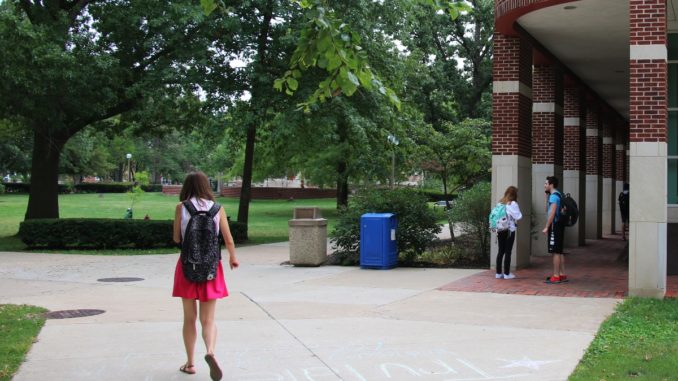
The Center for International Students at Truman State University is experiencing its lowest recruitment rate ever with a 300% increase in fall 2019 prospective students being denied a student visa.
Thirty international students have been denied a student visa, which is the highest amount the CIS has seen since 2004. Prior to that year, the biggest number of students turned away has only been 10.
CIS Director Melanee Crist said in a normal school year the CIS would’ve gained 114 international students instead of 94. The CIS always has a goal of 100 or more students, so Crist said staff can feel disappointed when a student is denied since that recruitment effort can seem emotionally and financially wasted.
Crist said the CIS focuses on bringing a diverse group of international students to campus which can be more difficult with a visa denial. The country that denied prospective students visas the most was Nepal, followed by a few rejections from Ghana, Nigeria, Ethiopia and China, Crist said. She said students from European countries aren’t affected as often by visa troubles.
Dave Rector, vice president for administration, finance and planning, said fall 2019 enrollment consisted of 374 international students, which make up 7% of Truman’s student body. As far as financial contribution, Rector said Truman would survive without a bigger international population as there are more in and out of state students.
Truman’s 2020 spring semester has 5,231 students, the lowest amount Truman has had in the past ten years, Rector said. While 30 students isn’t necessarily a dramatic drop, Rector said because of the current small Truman student body it would’ve been beneficial to have those 30 students enrolled.
If students are initially denied their visa, Crist said the CIS works closely with them to remedy whatever issue happened and help them reapply a second time.
“[The CIS] can provide documentation like a letter that talks about why this person is a good match for Truman and Truman’s reputation,” Crist said. “We come and advise them in a general way about addressing whatever the visa officer said because a lot of times the proof exists [for visa approval], but they just didn’t know what was going to be asked.”
Crist said the CIS will only defer a student twice since they don’t believe in a third referal and above. She said the CIS can’t invest the time and the money in an effort that won’t have a beneficial result for either party. Additionally, it’s not beneficial for the student to keep applying as it’s financially and emotionally draining for them, Crist said.
Freshman Shuyue Wang said the visa application interview is two minutes long, so it’s important to come prepared with answers to whatever questions are asked. Wang said immigration officers only ask up to three questions and often don’t tell a person why they’ve been denied a visa. This is frustrating since the person doesn’t know what answers or paperwork they need to change if they apply again, Wang said.
The student visa cost in China is ¥2,000, which equals $286, so applying several times is a financial strain, Wang said. She said immigration officers can be inconsistent with who they approve or deny since approval can feel like it depends on the mood of the immigration officer. Wang said she remembers going to the American embassy in China and feeling anxious as she waited in a long line of people.
“I was really nervous. I even signed the wrong name on my paper,” Wang said. “Before me [in the line] there was a bunch of study abroad groups probably camping and there were about fifteen people. One student was told she couldn’t go there to America and she was crying. I wondered, ‘Will I be denied?’”
Crist said student visa rejection can be affected by whether conditions in immigration law are applied loosely or strictly depending on the current political climate of anti-immigration. She said immigration law states that a person is seen as having immigrant intent until proven otherwise, so when people stay longer in a country than intended, the administration in response might tighten laws and issue fewer visas.
Students are also required to prove a closer connection to their home country when applying for a visa, Crist said. This is an important part of the Visa process as she said it shapes the status of the student’s immigrant intent. Crist said she thinks immigration officers might also be wary of students with certain majors, especially when considering what the student intends to do with their degree back home. The staffing of the U.S. consulate changes every three years, so Crist said visa approval can change depending on the attitude of the people hired. Additionally, a political election can also help or harm visa approval since every administration has its own agenda, Crist said.
The worst part about losing international students, Crist said, is that the CIS, the Truman student body and Kirksville miss out on what that student can culturally, academically and socially offer.
“We’ll always have international students,” Crist said. “I guess I’m just saying that not having the opportunity to welcome some that we thought would be a good match for Truman is a missed opportunity for the student and for Truman.”
Wang said the reason why international students decide to study at Truman is because the education quality is great, the price is affordable, and they get to experience American culture and become more open minded. If immigration laws continue to become stricter in the United States, Wang said students will just choose to study in other countries like Canada, the United Kingdom or Australia. She said Chinese students might also have a harder time applying for a visa now because of the coronavirus outbreak.
